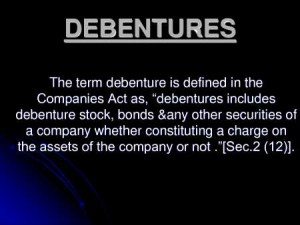Rights Debenture for Working Capital
Features
Trustee When a debenture issue is sold to the investing public, a trustee is appointed through a deed. The trustee is usually a bank or an insurance company or a reputable firm of attorneys. Entrusted with the role of protecting the interest of debenture holders, the trustee is responsible to ensure that the borrowing firm fulfills its contractual obligations.
Security Debentures are typically secured by a charge on the immovable properties, both present and future, of the company by way of an equitable mortgage, which is effected by deposit of the title deeds relating to mortgaged assets in favour of the trustees. Debentures not protected by any security are called unsecured or naked debentures.
Redemption Debentures are generally redeemable-perpetual debentures are very rare. The redemption takes place in a pre specified manner. Typically, it occurs between the 5th year and the 9th year. Companies are now required to create a debenture redemption reserve to facilitate timely redemption. A major requirement is that the company should create a Debenture Redemption Reserve equivalent to 50 per cent of the amount of debenture issue before debenture redemption commences.
Interest payment on debentures:
The interest payment on debentures is a fixed obligation, irrespective of the financial situation of the issuing firm. Typically payable semi-annually, it is a tax-deductible expense.
Rights Debentures for Working Capital
Public limited companies can issue “rights” debentures to their share-holders with the object of augmenting the long-term resources of the company for working capital requirements. The key guidelines applicable to such debentures are as follows
- The amount of the debenture issue should not exceed (a) 20 percent of the gross current assets, loans and advances minus the long-term funds presently available for financing working capital, or (b) 20 per cent of the paid-up share capital, including preference capital and free reserves, whichever is the lower of the two.
- The debt: equity ratio, including the proposed debenture issue, should not exceed 1:1.
- The debentures shall first be offered to the existing Indian resident shareholders of the company on a pro rata basis.

